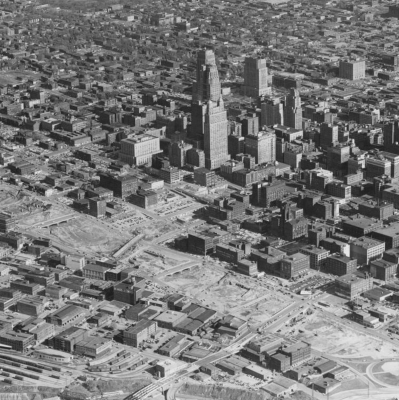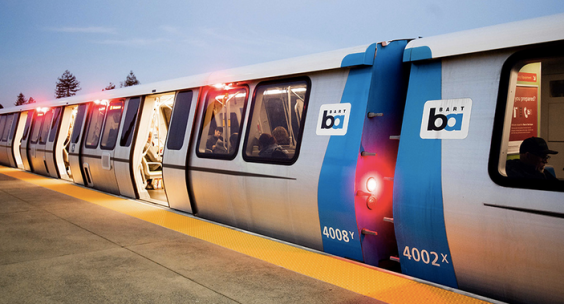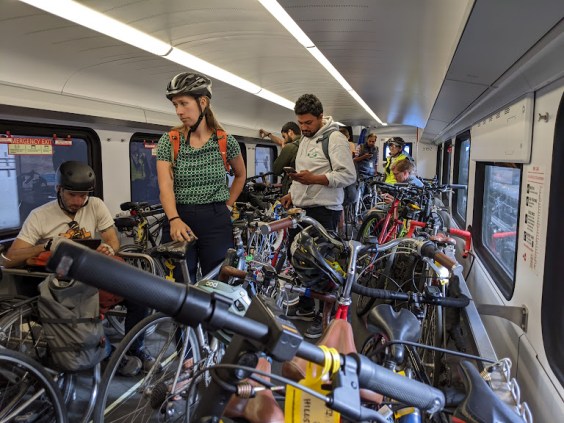Advocates are rallying to restore a visionary highway removal program that lost virtually all of its funding during bipartisan infrastructure negotiations despite President Biden and DOT Secretary Pete Buttigieg's big talk that they would use the package to repair the harm done by urban highways to BIPOC communities.
Senate negotiators stunned antiracist activists last week when they announced that the popular Reconnecting Communities initiative had been whittled down from proposed $20 billion in the American Jobs Plan to a mere $1 billion in the Bipartisan Infrastructure Framework — a 95-percent cut.
The first-of-its-kind fund would help cities remove, cap, or otherwise remediate damages from the hundreds of urban highways that were "deliberately built to pass through Black neighborhoods, often requiring the destruction of housing and other local institutions," to quote Biden's own memorandum vowing to redress those damages from earlier this year. As DOT Secretary, Buttigieg has emphasized over and over throughout his tenure — including in his confirmation hearing — those urban highways isolate, pollute, and destroy the economic prospects of hundreds of predominantly Black communities across America to this day.
Still, the White House celebrated the stripped-down program in its fact sheet on the new deal, singling out the proposed removal of a 1.4-mile section of Interstate 81 in Syracuse, N.Y. as a prime candidate for the funds — after which advocates quickly pointed out that the I-81 project alone, which has been approved and seeking funding since 2019, would cost about $2.2 billion, or more than twice the entire federal pot.
"All the money in this program, as it exists now, could be eaten up by just one project," said Ben Crowther, program manager for the Congress for the New Urbanism, a longtime champion of freeways-to-boulevards initiatives. "And it still wouldn't even fund half of it."
let's not forget the reconnecting communities program. which was literally one of Sec. Buttigieg's main talking points early on. https://t.co/RoqMGVvvR5
— Erika Young (@erikalyoung) July 29, 2021
The paucity of funds isn't the only problem. Crowther noted that because the bipartisan infrastructure deal isn't complete yet, the Senate has yet to disclose what rules will govern how the remaining $1 billion will be spent — which means it could be used in ways that further harm the Black and brown communities whose homes were destroyed by highways in the first place.
The House's core infrastructure reauthorization bill, the INVEST in America Act, includes a version of the Reconnecting Communities program that would emphasize projects that ensure inclusive economic development and environmental justice — but the Senate's bill, the Surface Transportation Reauthorization Act of 2021, so far contains no mention of those critical protections.
"Right now, it seems like the [Senate's highway bill] is going to guide this program, and that bill is lackluster at best," added Crowther. [Editors Note: Following the release of the full text of the bill shortly after publication time, Crowther's suspicions were proved correct.] "It doesn't have the guidelines and guardrails that makes sure these projects are being done with an eye towards helping the people who live near these highways now, like anti-displacement protections, or community engagement and capacity building grants to help build a vision for their communities with residents, at a grassroots level. We don't just need more funding; we need to create a program that achieves the goals of environmental justice and racial equity."
Who else has been let down by the outcomes of bipartisanship?
— Jordan van der Hagen (@TheJvandy) July 29, 2021
That’s me today, especially pertaining to the gutting of the Reconnecting Communities program included in the infrastructure bill. pic.twitter.com/OTyuhQo6WF
That's a particular blow to anti-highway activists who are working to realize such antiracist visions in their own neighborhoods. But some see a silver lining to the news that a highway removal program got a bipartisan rubber-stamp at all — even if the amount it received is negligible for now.
"It's a far cry from what we were looking for, without question, at least now we've established a foundation of bipartisanship that [lawmakers] can point to," said Keith Baker, executive director of the nonprofit Reconnect Rondo, which is working to build a land bridge to reunite two halves of the historically Black St. Paul neighborhood, centering the needs of the descendants of families who were evicted to build Interstate 94. "We're hoping that helps set the stage for [more funding] through a reconciliation package or another bill."
That might be an uphill climb, considering how conservative lawmakers and media outlets lampooned Buttigieg for pointing out the racist impacts of the Interstate Highway Program.
Baker emphasizes that the Rondo project isn't betting its future on the federal government, and had found other forms of public, private, philanthropic, and even crowd-funded support long before the Reconnecting Communities program was proposed. But if more money isn't won in Washington, it will make the path to realizing the project more challenging — and not just in Minnesota.
"It's a heavier lift, there's no question about it," added Baker. "We've got 1,200+ communities across the U.S. that were impacted by the freeway system. [Losing these funds] will place a greater burden on the private sector, and on people within communities, to make up the difference. A billion isn't a whole lot. ... It's really putting us back in that scarcity mindset."
$1B to fix the problem and how many tens of billions to create or exacerbate it? I guess in 5-8 years, we will have to fix it, but not before damage is done. And we will need to convince our leaders on both sides of the aisle to be more concerned about outcomes than the deal. https://t.co/XrbGNwKkUP
— Beth Osborne (@BethOsborneT4A) July 29, 2021
One group that certainly isn't facing a scarcity of federal funds, meanwhile, are the highway builders.
The bipartisan deal includes a whopping $110 billion boost for roads — a historic amount that advocates fear will be used to divide even more Black and brown communities. Buttigieg has already helped pause racist highway projects in communities like Houston, but the federal stimulus package could open the floodgates on such projects, while leaving long-sought highway removal efforts — like Interstate 375 in Detroit and McGrath Highway in Sommerville, Mass. — languishing on the budget sheet.
The Congress for the New Urbanism and other groups say that can't be allowed to happen, and are urging advocates and organizations to speak out. And in the meantime, advocates like Baker are keeping their eye on the ball.
"From what we've heard from the Biden administration and more direct conversations with [acting Federal Highway Administrator Stephanie] Pollack, the fight is not over," said Baker "It's a bit of a reset. But if one door closes, we'll find a window."






